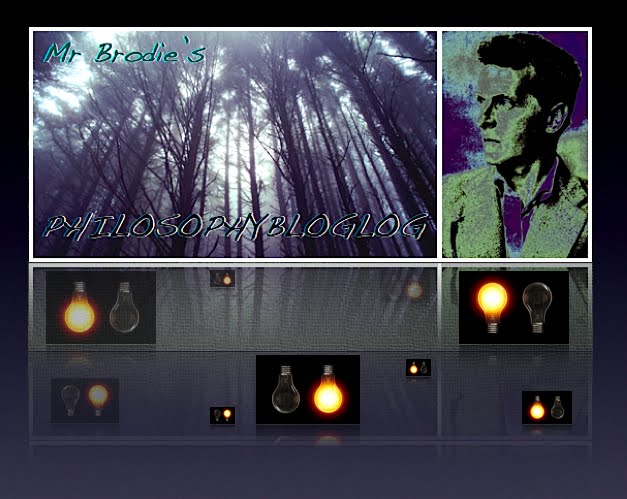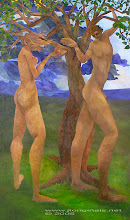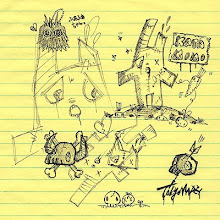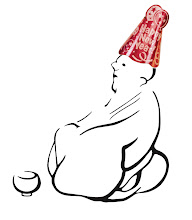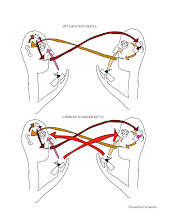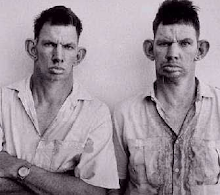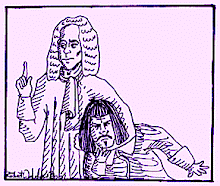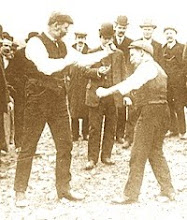Below is a revised, redrafted and extended (hurrah! they cry) version of the various notes I have written with you and last year's lot on this wax business. It's got quite long and I possibly repeat myself a little, but it has been useful to me to re-read and re-write it, so I hope it will help you. I suppose it represents a kind of response to the wax essay question, but try not to rip me off too much. (You might be better off writing your response before you read it).
Anyway ...
Descartes’ ‘Meditations’ are an attempt to find the foundations of objective (certain and unchanging) knowledge. Descartes believes that if he can find an ‘Archimedian point’ - just one thing about which there can be no doubt then he will be able to ‘ground’ all his other ideas. It is an attempt to construct a complete epistemology - a theory of knowledge - by building, piece by piece (brick by brick) on his foundation of certainty. (The cogito)
Having found his one point of certainty, that he exists as a ‘thinking thing’ Descartes tries to work out the status of the ideas that run through this ‘thinking thing’ that he is. His problem is that most of his ideas seem to come through his senses and he has already shown these to be unreliable and deceiving.
He decides that this thinking thing is ‘a thing that doubts, perceives, affirms, denies, wills, does not will, that imagines also and which feels.’ These activities of the mind are the more certain the less they have to do with the physical world. Therefore the imagination, which seems to build its ideas from perceptions of the physical world is less trustworthy than, for example, the act of doubting, (Remember Descartes prefers geometry to geography for similar reasons.)
In his Second Meditation, having pushed his scepticism, his 'method of doubt', through arguments concerning illusion and dreams and on to the point of considering that a malignant demon might be feeding him illusions about the world, Descartes, finally arrives at his point of certainty, 'I am, I exist', he claims, and goes on to say that this 'must be true whenever I assert it or think it.' To be thinking the thought of one's existence is, in itself, proof of that existence, he says.
Although Descartes is now certain of his existence as a mental entity he is still in doubt about the thoughts and ideas that he has as a thinking thing. (where do they come from? how trustworthy are they? are some more trustworthy than others?) He thinks again about the ideas that seem to come to him through the senses and begins to reconsider the physical world and the way he perceives it in order to understand how it is that he can be certain about his mental existence, but in doubt about the physical world.
In a famous passage he considers the way his senses give him perceptions of a piece of wax, and how those perceptions are utterly different and distinct depending on whether the wax is hard or melted. He concludes that although we normally understand our senses as providing us with understanding: to 'see' something is to understand it we believe, the example of the wax shows Descartes that 'Something that I thought I saw with my eyes ... was really grasped solely by my mind’s faculty of judgment.
Descartes discussion of the wax is central to understanding his notion of what it is to be a human being. It is his ability to conceive (have a concept of) the wax that, for him, demonstrates the power of rational thought. He concludes that because the information given to him by his senses about the wax is insufficient to allow him to know that the wax remains the same thing after it changes all its sensible qualities, it must therefore be his 'reason', his faculty of judgement that gives him knowledge of the wax. It is as if through the power of rational thought the sum of his understanding is greater than the understanding his senses alone could provide. This 'added power' provided by ‘reason’ is the underlying principle of Rationalist philosophy.
Descartes believes that knowledge of the external world is gained through the mind’s understanding (judgement) of the information we receive through the senses. The faculty of judgement is a mental capacity (ability) that brings together the ‘raw’ and potentially incoherent information of the senses and allows us to understand. This makes him a rationalist as opposed to an empiricist. (we're doing them next).
For Descartes, this wax business confirms his belief that, he can know his internal world - his mental processes - better and more certainly than he can the external physical world. This emphasises the separation and the difference of the two ‘stuffs’ mental and physical and makes clear his ‘dualism’.
